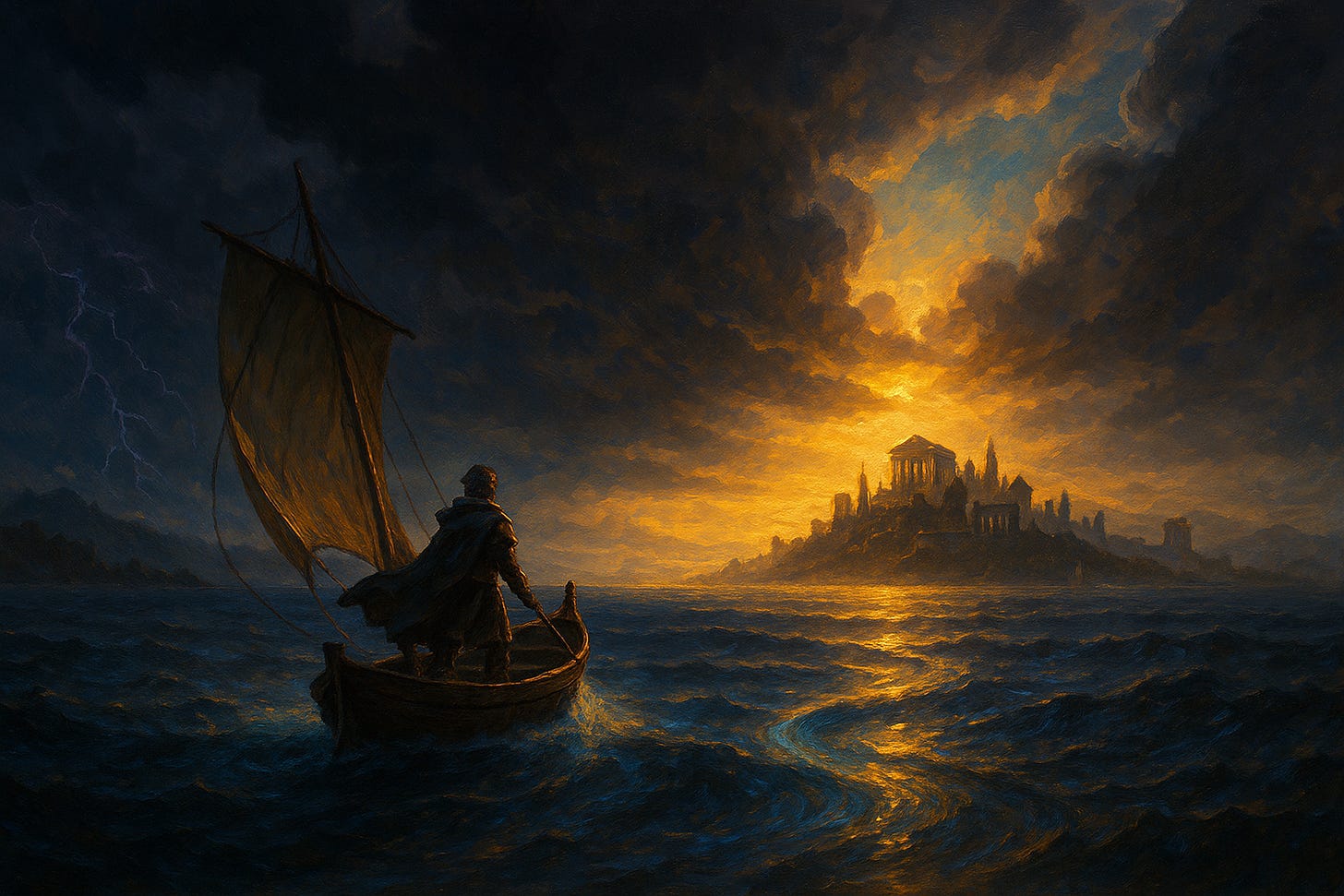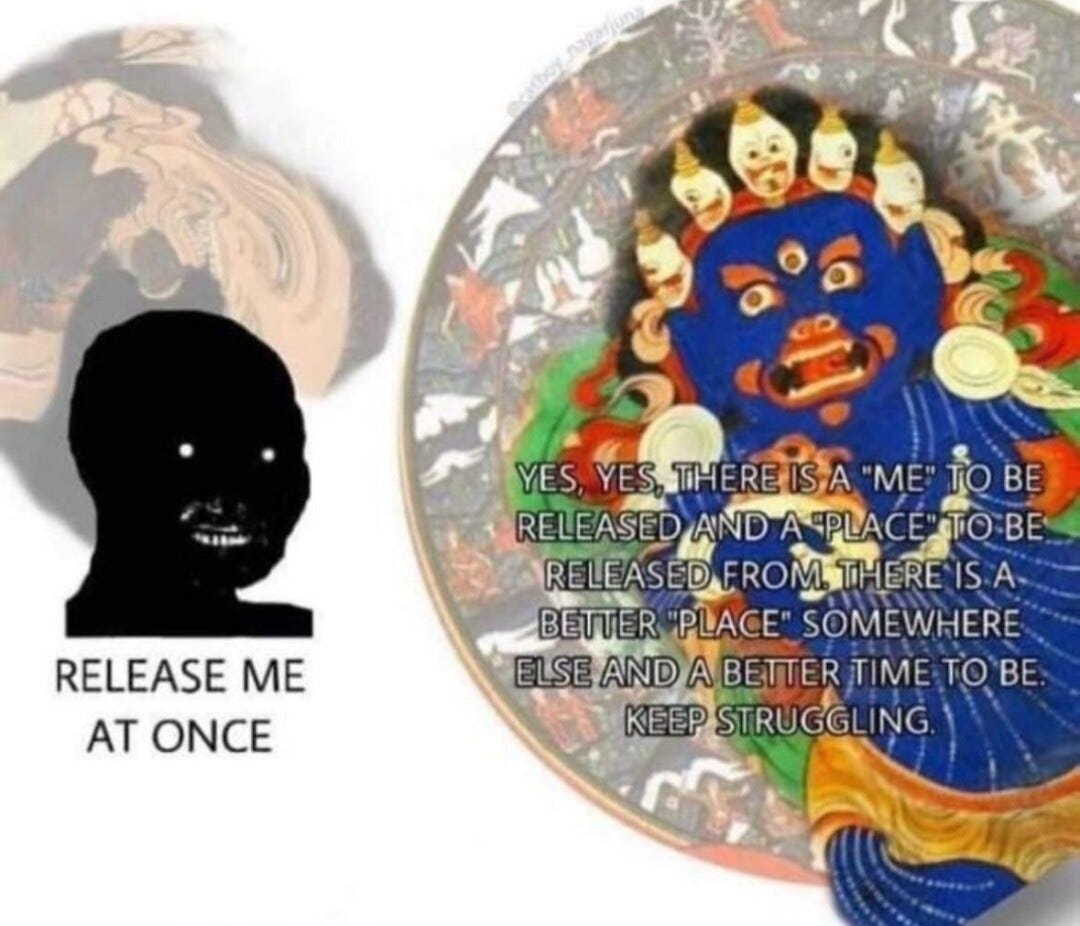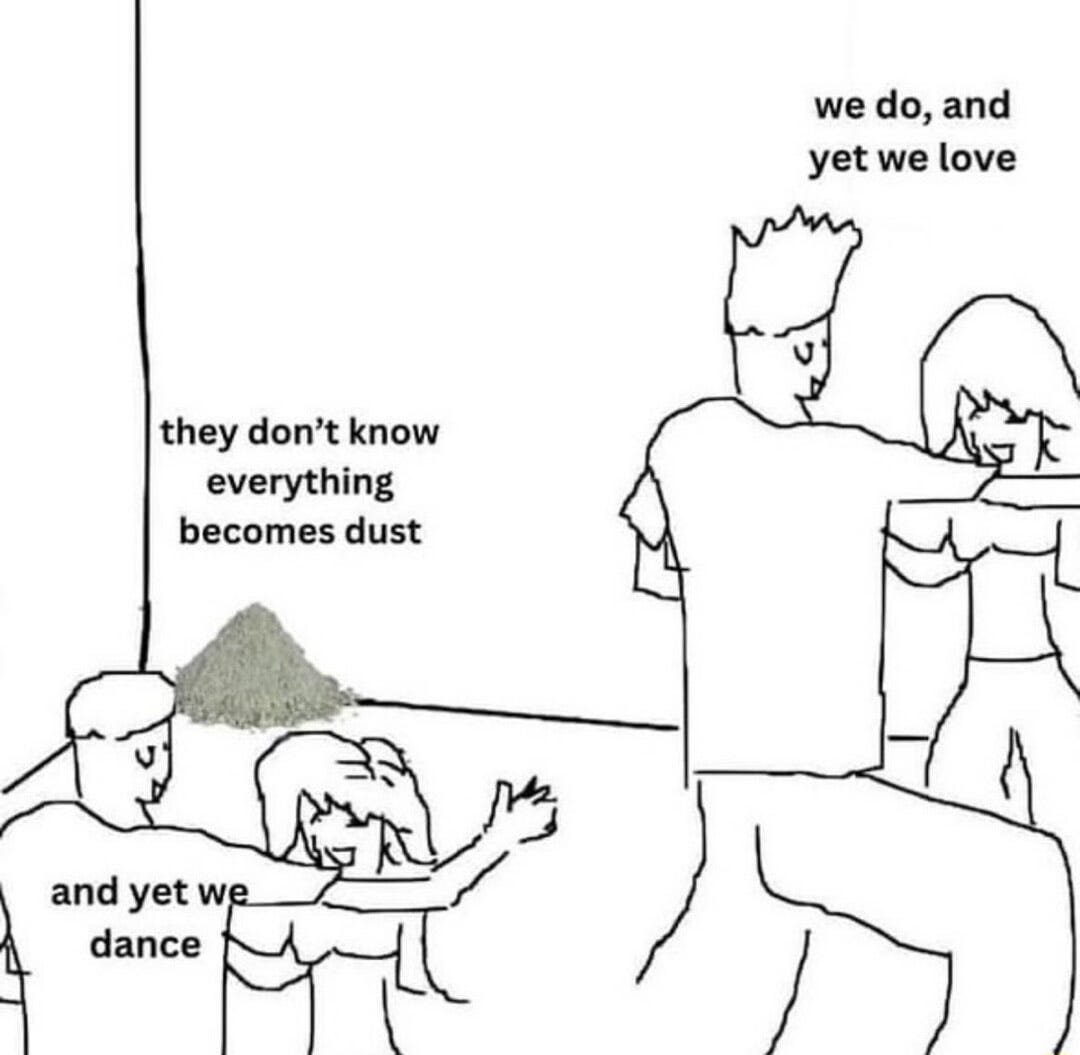Nostos
Meditations on Progress

This is Part 1 of a 5 Part series. You can find the other parts here: Part 2. Part 3. Part 4. Part 5.
I’ve been trying to write this for a long time. Not because I couldn’t find the words, but because the words kept changing as I understood more. Each attempt revealed something I hadn’t considered before. This version won’t be final either, but perhaps it’s time to share the map I’ve drawn so far.
This is a meditation on Progress.
Not the comfortable myth of inevitable improvement, nor the fashionable cynicism that denies it entirely. It’s about how Progress actually happens, how we can get to the Good World, and why we might not.
I’ll be using Mythic language throughout. When words are Capitalized, they’re not meant literally, they’re meant as pointers, hints at deeper things that would take many, many pages to explain, or for which I lack the skill to explain them entirely. The Stream, the Falls, the Ocean, the Stars, the Hero’s Journey.
If this mode of writing bothers you, this essay isn’t for you. I need these tools to talk about things our everyday language wasn’t built for.
Fair warning: This essay makes claims that will sound religious to atheists and atheistic to believers. It’s ambitious, it’s indulgent, maybe even uncomfortable.
But comfortable narratives haven’t been working. We need stories equal to our moment, when humanity wields the power to destroy itself, when we are teetering on the Edge of the Abyss.
Join me on this Expedition. We have a long way to go, and we can’t stay here.
1. The Call
I want to Go Home.
Not literally, of course. I am sitting comfortably in my lovely apartment, living within a comfortable distance of my workplace and friends. My lowercase-h home is pretty great and I enjoy being here.
But it is Temporary.
The world is not Ok. The world is not Just, it is not Kind. It is filled with suffering of scopes so unimaginable that we can only numb ourselves to its true, grotesque intensity and scope.
This is not Home.
Why do we all seem to know what Home means, even when we’ve never had it? Why does every human culture have some vision of a Golden Age, a Paradise, a Pure Land?
I think the simple answer might be the most true: We are pattern-recognizing creatures who can’t help but notice what’s missing. We experience moments of safety and imagine perfect safety. We feel love and imagine infinite love. We solve problems and imagine a world without problems.
We are beings capable of envisioning states of existence better than any we’ve experienced. This is both our gift and our burden. Unlike other animals that might simply seek Shelter, we seek Home. Not just physical protection, but existential Belonging, not just safety but Meaning, not just survival but Flourishing.
Of course we want to Go Home. Wherever that Home might be, or even if we have to create it.
Hiraeth
There is a word I really love, it’s stuck with me in many ways throughout my life. It’s an ancient Welsh word: Hiraeth.
It translates to something like “a deep longing or nostalgia for a home you cannot return to, or perhaps that never existed.”
English is usually pretty good at having expressive words for emotions, but this one is sorely missing. I think it’s a pretty core experience of being human.
I’ve experienced a lot of Hiraeth throughout my life, sometimes for places or times long gone, or for relationships that didn’t work out the way I was hoping they would. Hiraeth is not always sorrow, though it can be.
The part of Hiraeth that sticks with me the most is the “...or that perhaps never existed.”
This is a pretty core experience I’ve had many times, longing for a place, a time, a state of being that never actually existed. An idealized youth, a rose tinted memory of a romantic relationship, a broken homestead that could have worked out, if things had been just a little different...
But these places were never real.
I recently had a very nice reminder of this.
I have very strong Hiraeth for a certain set of circumstances from my late teens1, where I thought I had, or was in the process of carving out, a true Home…but then everything Went To Shit.2
But I have something most people do not: I have extensive logs of messages, communications, calls, notes, documents, etc from that time. I knew I would want them again in the future, and I had the foresight to carefully archive them.
So lately, I’ve done what I hadn’t dared in over a decade, and I opened the archives, and started pouring over and analyzing the logs.3
And I found what I expected to find: The idealized, rosy Home I had in my head…never existed.
It was pretty shit, and cringe, even before everything Went To Shit. So much of the mythologized version of that Home was just not true on sober analysis, born rather from rose tinted delusion.
But…there wasn’t nothing in there.
There were…lets call it Shards of a Home in there. Shards that I had neglected in my life since then. And suddenly, being confronted once more with them I noticed: “Wait, I actually care a lot about these Shards. What happened to them? How could I have forgotten and neglected them for this long?”
There were hints in those Shards, a Call…to Return…to a Home…across the Sea.
It prompted me to reflect on The Call, and where it was calling me, where it is calling us, to. The urge to mount the Journey, to return Home, to sail towards the Ocean.
Where is it Calling us to, and can we even reach it? Is there even a place to reach? Is there anything out there?
Our Home is out there, across the Ocean, we must merely follow the Stream…
The Sound of Distant Thunder
There is Thunder in the distance, and it’s drawing nearer. Or we are drawing nearer to it.
The Buddhists have a concept I really like, called “sotāpanna”, “stream-enterer.” I’ve found myself using this phrase a lot lately.
In this framework, “stream-entry” is the first stage of Enlightenment, where once you have reached this stage, although you are not yet proper capital-E Enlightened, you are “in the Stream”, and you will be washed downstream to the great Ocean of Enlightenment (“nibbāna”), sooner or later. You’ve done, in some sense, the hard part.
Sure, there’s still a long Stream ahead for you to follow, and it might take you several lifetimes4, but you’re On Track to reach it now.
In a sense, this is strange. Why should there be a Stream at all? Why isn’t every step towards Enlightenment as fraught and liable to throw you off as the last? Why would there be a Stream, channeling us almost mercifully towards Enlightenment? It seems hard to believe…divine, even. Maybe there is a loving god after all, that so mercifully designed for us a Stream to Enter?
But if there is a loving god protecting us…why do I hear Thunder?
Enlightenment
I am a child of the Enlightenment. Not Buddhist Enlightenment, but THE Enlightenment, the western period of scientific and social revolution starting in the late 17th century. It’s funny how those two use the same word, I always thought that was a bit cringe, but I now think there is something deeper.
To avoid confusion, I will be referring to the Western Enlightenment by its French name "Les Lumières”, while I refer to Buddhist Enlightenment as ”Sambodhi”.
There are deep connections between Les Lumières and Sambodhi, but they’re not the same thing. They are more like two different stabs at something deeper. Neither of them have the Full Story. I will be using the word “Enlightenment” to refer to the Full Story.
As said, I am a child of Les Lumières, my Home lies in some kind of proverbial “Sukhavati”5, far across the Ocean.
I am very western, very scientifically minded. I am an atheist, a Darwinian, I do not think there is a loving god, I think the universe is cold and uncaring.
And yet, it moves. “Eppur si muove.” The Stream flows.
Theodicy
Historically, the West was mostly adherent to the religion of Christianity6, which posits the existence of a supreme being that is omnipotent (all powerful), omniscient (all knowing) and omnibenevolent (all loving).
This poses a rather critical problem when confronted with the real world: If god is almighty and kind, whence evil?
This question became so all consuming it got its own cute name: “Theodicy”
It’s become somewhat cringe to talk about Theodicy these days, you can thank the New Atheists for that. But just because they were cringe doesn’t mean they were wrong.
The world is indeed full of Evil, suffering and horror so utterly beyond the pale, so twisted and perverse and all pervasive, there is simply no logically compatible way of positing an omnipotent, omniscient, omnibenevolent god in such a world.
And trust me, people have tried.
The atheist and the buddhist don’t have this problem. For the Buddhist, it’s trivial why there is evil. We live in Samsara, a world of suffering and craving and attachment. It’s suffering all the way down. Why would you think it wasn’t?
For the atheist, the answer is similar, but with the cute addition of the magic sounding word “Entropy”.
The world is full of suffering, because it’s the easier option, the default. There are infinitely more ways to be unhealthy, hurt, dead than there are to be alive and healthy. Being alive and healthy is a very, very specific and unusual state for your atoms to be in. Entropy pushes the world towards less such special states, towards finely ground down, equally distributed emptiness. Why would you ever think it was any other way?
And yet, we sing, we love, we dance.
This poses an interesting challenge. Atheism has a kind of “reverse Theodicy”: If the universe is cruel and uncaring, whence Good?
Christianity has difficulty explaining Evil, but Atheism has difficulty explaining Good. Curious, but unlike in the theistic case, not unsolvable.
There are answers to these questions that do not involve positing some form of benevolent divine intelligence.
Why is there Good? Why does there seem to be a Stream that leads us to Good? What lies at the end of the Stream, and how can we Enter it?
How can we make it to the Good World? Deliver us from Evil. Find Home.
To answer these questions, we must mount an Expedition.
The Expedition to the Far Lands
The Stream bubbles forth from remote springs in the Far Lands. It is not cloaked in the comfortably, safely normal and non-cringe concepts from daily, samsaric life. If we wish to find its source, map its shores and navigate it safely to The Ocean, we must venture into the Underworld, and we might not succeed.
Join me on this Expedition. It will take everything we’ve got, and some more.
This is Part 1 of a 5 Part series. You can find the next part here.
It’s a long, and mostly unimportant, story.
Not a rare experience of a late teen Romance.
LLMs and good data processing skills help a lot here.
The Buddhists believe in reincarnation, more on that later.
“Sukhavati” is a concept in certain forms of buddhism that refers to the “Western Pure Land”, a mythical land to the west where one has all the time and peace needed to perfect one's happiness and Enlightenment.
You can imagine a “Pure Land” as a little bit like a milder version of a Christian Heaven. Not eternal divine bliss, but more like a perfectly patient, calm, beautiful world, where we have as much time as we need to Get Ready, to gently and patiently complete our journey to Enlightenment.
Despite my disagreements with a lot of the practitioners of this belief system, I find this concept of the Pure Land a very appealing idea. The fact Sukhavati specifically is claimed to be in the “West”, the home of Les Lumières, is mostly a coincidence, but a curious one that I am happy to abuse as a metaphor for this essay.
Which is also the faith in which I was raised, though not very intensely.





"This poses an interesting challenge. Atheism has a kind of “reverse Theodicy”: If the universe is cruel and uncaring, whence Good?
Christianity has difficulty explaining Evil, but Atheism has difficulty explaining Good. Curious, but unlike in the theistic case, not unsolvable."
Yes! I think this also ties into another pattern: atheists have a harder time practicing goodness and virtue than religious people, especially from the religions of the book.
My model is that as you suggest, nihilism or cynism is an attractor for atheism because it can so easily conceptualize the bad, the terrible, the dead. Whereas for all their failings, many religions have shards of the good: charity, humility, trying to improve the world.
Although it's dead now, the Ancient Wisdom Project (https://theancientwisdomproject.com/) was an interesting attempt at distilling these shards through practice: the guy picked a religion/spiritual tradition per month, a couple of key practices from this religion, and did it for the whole month to see what it led to.
"The Buddhists have a concept I really like, called “sotāpanna”, “stream-enterer.” I’ve found myself using this phrase a lot lately.
In this framework, “stream-entry” is the first stage of Enlightenment, where once you have reached this stage, although you are not yet proper capital-E Enlightened, you are “in the Stream”, and you will be washed downstream to the great Ocean of Enlightenment (“nibbāna”), sooner or later. You’ve done, in some sense, the hard part."
I had never heard of this concept, but it resonates a lot with what I wish for. My own difficulties with virtue, wisdom, and progress has been finding a way to enter the Stream (at least the Wisdom version of it), what I expect you would call a reliable Process to keep moving towards the end goal. Instead I find myself taking local gradients that are broadly good, but without knowing that they lead to an end goal, or even really understanding what the good end-goal is.
"There are deep connections between Les Lumières and Sambodhi, but they’re not the same thing. They are more like two different stabs at something deeper. Neither of them have the Full Story. I will be using the word “Enlightenment” to refer to the Full Story."
lol, based
(also hi connor nice to see youre still alive :D)